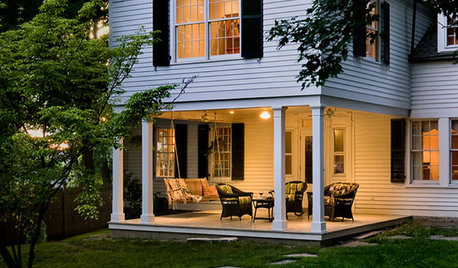Latest Climate Change Report: comments and opinions?
carol6ma_7ari
9 years ago
Related Stories

DECORATING GUIDESNo Neutral Ground? Why the Color Camps Are So Opinionated
Can't we all just get along when it comes to color versus neutrals?
Full Story
EVENTSReport From Italy: Mustard Yellow, Hidden Kitchens and More
See what our team in Italy discovered at Salone del Mobile 2016. Which new design idea speaks to you?
Full Story
DECORATING GUIDESSpecial Report: Design News from Toronto
See playful color, fur pendants, ornate chandeliers, dark wood and more at the 2011 Toronto Interior Design Show
Full Story
Special Report: Interior Design News From Cologne
Take a Photo Tour of the Latest Furniture Innovations Headed Our Way
Full Story
SELLING YOUR HOUSEHome Staging to Sell: The Latest Techniques That Really Work
Get up to speed on the best ways to appeal to potential buyers through accessories, furniture, colors and more
Full Story
You Said It: Hot-Button Issues Fired Up the Comments This Week
Dust, window coverings, contemporary designs and more are inspiring lively conversations on Houzz
Full Story
MOST POPULARHow Bluetooth 4.0 Will Change Remote Control
Manage lights, TV, refrigerators and more through your phone or tablet when the latest wireless technology rolls into all your home devices
Full Story
BATHROOM DESIGNSweet Retreats: The Latest Looks for the Bath
You asked for it; you got it: Here’s how designers are incorporating the latest looks into smaller master-bath designs
Full Story
SELLING YOUR HOUSEThe Latest Info on Renovating Your Home to Sell
Pro advice about where to put your remodeling dollars for success in selling your home
Full Story
INSIDE HOUZZHouzz Survey: See the Latest Benchmarks on Remodeling Costs and More
The annual Houzz & Home survey reveals what you can expect to pay for a renovation project and how long it may take
Full Story







prairiemoon2 z6b MA
diggingthedirt
Related Professionals
Ilchester Landscape Architects & Landscape Designers · Owings Mills Landscape Architects & Landscape Designers · Cornelius Landscape Contractors · El Mirage Landscape Contractors · Galveston Landscape Contractors · Lewisville Landscape Contractors · National City Landscape Contractors · Tinton Falls Landscape Contractors · Waldorf Landscape Contractors · Quartz Hill Landscape Contractors · Conroe Decks, Patios & Outdoor Enclosures · King of Prussia Decks, Patios & Outdoor Enclosures · Methuen Decks, Patios & Outdoor Enclosures · North Myrtle Beach Decks, Patios & Outdoor Enclosures · Pataskala Decks, Patios & Outdoor Enclosurestree_oracle
prairiemoon2 z6b MA
mad_gallica (z5 Eastern NY)
prairiemoon2 z6b MA
tree_oracle
diggerdee zone 6 CT
Persimmons